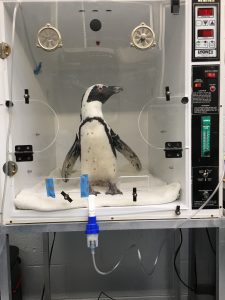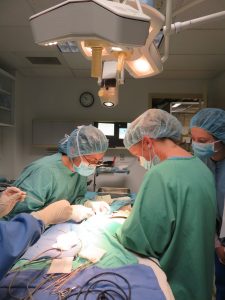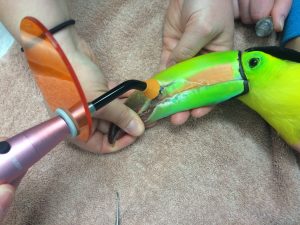Customized Medicine and Innovations in Avian Care
Just as each human’s health needs are unique, so are the health needs of each individual bird. Birds have delicate, complicated systems, are generally fragile, and many species are very small. The National Aviary’s Avian Hospital has developed many new techniques and adapted procedures, medical equipment, and medications to care for these fragile creatures.
Customized Medicine
To treat the wide variety of species who call the National Aviary home, the veterinary team customizes treatments and prescriptions for each bird. Parrots receive a banana-flavored antibiotic syrup, while African Penguins are treated with individually made capsules hidden in their fish.

Often, the veterinary team will modify medications intended for use in dogs, cats, horses, and even humans. Penguins have fragile respiratory symptoms and are prone to pneumonia. The National Aviary developed a preventative treatment for penguins using a human nebulization medication. With the penguin placed in a clear ICU box, we can administer the nebulization for a short period of time, for a very safe, easy, and effective treatment to control serious fungal pneumonia.
Microsurgery

The National Aviary’s veterinary team have performed microsurgery on patients as small as 12 grams (about the size of a red grape.) Surgical instruments used by veterinarians on dogs are too large for use on tiny patients, so veterinarians at the Aviary use human heart and eye instruments to handle delicate tissue.
To administer anesthesia for surgeries, our veterinary team makes tiny breathing tubes from intravenous catheters. Breathing tubes do not exist for animals smaller than a kitten. Anesthesia masks are also customized and hand-crafted for each bird. To fit the long, wide bill of a Toco Toucan, for example, vets may modify a two-liter soda bottle.
Beak Repair

Chips and breaks to the beak can commonly occur in birds. In the wild, a damaged beak may mean that a bird will be unable to eat, but at the National Aviary, beak repairs can be done quickly and an injured bird can soon return to eating normally.
Our veterinary team uses a specialized process to repair beaks using the same dental acrylics used to repair human teeth. We can also mix pigment in with the acrylic to match the color of the beak, making the repair more natural. In cases of broken beaks, the veterinary team can create bridges, and can even make prosthetic beaks.
